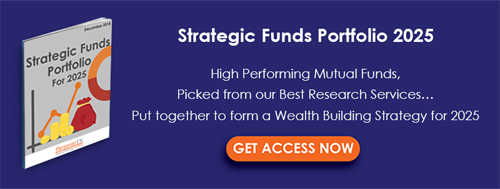Indians love discussing politics, irrespective of whether they are associated with any political party.
Similarly, Indian markets love politics, irrespective of whether they really benefit from any specific party forming a government in the country. Yet, they experience a great deal of volatility when elections are around the corner.
If you take into account the Lok Sabha elections and various state assemblies, India is always in election mode. And you will find political parties campaigning all the time in one or another part of the country. The Lok Sabha elections are of immense importance, primarily because they decide the direction of various policies.
As always, the markets are oscillating amidst the hustle and bustle of the political world these days. Many were anticipating them to react negatively after BJP lost their foothold in three crucial states. However, the markets’ resilience took everybody by surprise.
This makes it somewhat clear that markets aren’t factoring in the possibility that BJP-led NDA could lose the Lok Sabha 2019 elections.
Market experts have been advising investors to exercise caution until elections. According to them, the climate is unfit to take any big investment decision before India gets its next government.
Is this applicable to mutual fund investors or anybody else for that matter?
Not really!
If you take such advice seriously, then you will end up being a speculator who reacts to everything but makes money from nothing!
On numerous occasions, markets have failed to anticipate the election results and flunked in forecasting the direction of economic policies of the newly formed governments.
For example, in 2009, markets had hit an upper circuit twice in a day, the first time in the history of Indian markets, when UPA came to the power for the second consecutive term. But after that, markets fretted over the efficacies of the UPA-2. And what on the political canvas will justify the rally of 43% that Sensex witnessed between April 1999 and September 1999?
Table 1: Which party forms the government: Is that a factor at all?
| Election months |
Returns generated in 6 months prior to elections |
Returns generated during the 6 months following elections |
| September-October 1999 |
43.3% |
0.8% |
| April-May 2004 |
13.9% |
30.0% |
| April-May 2009 |
-0.8% |
16.8% |
| April-May 2014 |
5.8% |
12.9% |
(Source: BSE)
Therefore, holding back your investments until elections is an imprudent strategy, which could prove futile.
So, where and how should you invest?
Invest as per your financial goals. Remember, setting SMART financial goals is very important because it provides a purpose. Further, having a financial plan in place––a roadmap to accomplish the envisioned goals ––is the key to effective investment planning.
[Read: What Could Make Or Break Your Financial Goals]
Here are the 7 Steps involved in prudent planning:
- Make your financial goal worksheet ready
- Prioritise your financial goals
- Set time horizon to classify goals into short-term, medium-term, and long-term
- Estimate the corpus you need to achieve each financial goal
- Consider your risk appetite
- Get started (i.e. invest) to accomplish the envisioned financial goals
- And keep reviewing investments and financial goals rationally to ensure you are on track to accomplish them
Likewise, make sure you have charted out a personalised asset allocation plan carefully based on your
financial goals and risk appetite. This will give you a clear idea about which asset classes you need to invest in and their proportions.
As you may be aware,
equity mutual funds are one of the best ways to invest in equity as an asset class and can help you plan your long-term goals.
When investing in mutual funds prefer direct plans and invest through Systematic Investment Plans (SIPs).
Once you invest in congruence to your financial goals in appropriate asset classes and investment avenues therein, you need not bother about specific events such as elections. Let’s not forget that governments may come and go, but it’s difficult to reverse the good long-term decisions taken by one government.
- Do you think the next government can roll back GST?
- Do you think the next government can dismiss the Monetary Policy Committee (MPC) at RBI?
- Do you think the next government can annul the Insolvency and Bankruptcy Code?
If your answer to all the questions above is no, then election-related market anxiety is unwarranted!
Now it’s up to you whether to mess up your finances by speculating on the results or staying unmoved and investing as per your plan.
PS: Here is a strategy that has the potential to beat the markets in the next 7-8 years. Our ‘Strategic Funds Portfolio for 2025’ is backed by the ‘core and satellite’ approach of investing that many successful investors have adopted for long-term wealth creation.
If you’re an investor looking for “decent investment gains at relatively moderate risk” PersonalFN’s Premium Report, “The Strategic Funds Portfolio For 2025" could be a ready solution for you.

This report contains a ready-made portfolio of some of the best equity funds picked by our research team for the year 2025 that have the potential to generate lucrative returns over the long term.
Click here to know more and subscribe.
Add Comments